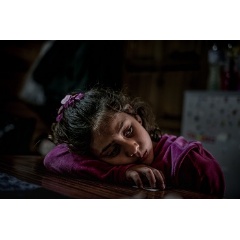Growing number of unaccompanied refugee and migrant children in Greece in urgent need of shelter, care and protection
UNICEF urges solutions to help children without families

Only a third of the nearly 3,000 unaccompanied refugee and migrant children currently in Greece are receiving proper shelter and care, UNICEF warned. The children’s agency is urging key policy and legal reforms to help keep vulnerable children safe.
The recent surge in the refugee and migrant arrivals has led to further overcrowding and deteriorating living conditions in island camps. In September this year there were more than 5,700 arrivals in Greece compared to an estimated 3,080 arrivals in September 2016.
On the islands, some reception facilities for unaccompanied children are now hosting twice as many as they were designed for, compromising the safety and wellbeing of the children. They are particularly vulnerable at night without proper safeguards in place. Long delays of up to five months in transferring children from the islands to the mainland are compounding their emotional and mental strain.
There are now some 1,800* unaccompanied children waiting for a place in shelter, living in open sites, reception centres, or who are otherwise stranded on the islands or in de facto detention centres. Some of these children are even living on the streets, and the approaching winter is adding to the risk.
“Children stranded without families should have proper shelter, care and protection, and there are solutions that could make this a reality for them,” said Laurent Chapuis, Country Coordinator for UNICEF’s refugee and migrant response in Greece. “Unaccompanied children stuck on the islands should be transferred to shelters on the mainland without delay; existing shelters with the right standards should receive available funding and there needs to be more foster care or supervised living schemes. This can all be done.”
UNICEF is also calling for urgent policy and legal reforms to strengthen community-based care after years of economic hardship in Greece. For those children who have family elsewhere in Europe, UNICEF is urging other European countries to step up family reunification.
“The Greek authorities and their partners on the frontline of the European refugee and migrant crisis since 2015, have made tremendous efforts in responding to the needs of children and families,” said Chapuis, adding that conditions in reception centres on the mainland have improved and transfers from the islands have recently accelerated.
The numbers of unaccompanied children in Greece increased through the summer – from 2,300 at the end of June to 2,850 at the end of September. There are an estimated 19,000 refugee and migrant children in Greece today with unaccompanied children accounting for roughly 15% of the total number of child arrivals.
*Of the 1,600 unaccompanied children those in acute need include 106 in detention, 228 in reception and identification centers on the islands and 194 in safe zones
Note to editors: UNICEF continues to call on governments to adopt its six-point agenda for action to protect migrant and refugee children and ensure their wellbeing:
1. Protect child refugees and migrants, particularly unaccompanied children, from exploitation and violence;
2. End the detention of children seeking refugee status or migrating, by introducing a range of practical alternatives;
3. Keep families together as the best way to protect children and give children legal status;
4. Keep all refugee and migrant children learning and give them access to health and other quality services;
5. Press for action on the underlying causes of large scale movements of refugees and migrants;
6. Promote measures to combat xenophobia, discrimination and marginalization in countries of transit and destination.
About UNICEF
UNICEF works in some of the world’s toughest places, to reach the world’s most disadvantaged children. Across 190 countries and territories, we work for every child, everywhere, to build a better world for everyone.
( Press Release Image: https://photos.webwire.com/prmedia/7/215888/215888-1.jpg )
WebWireID215888
This news content was configured by WebWire editorial staff. Linking is permitted.
News Release Distribution and Press Release Distribution Services Provided by WebWire.